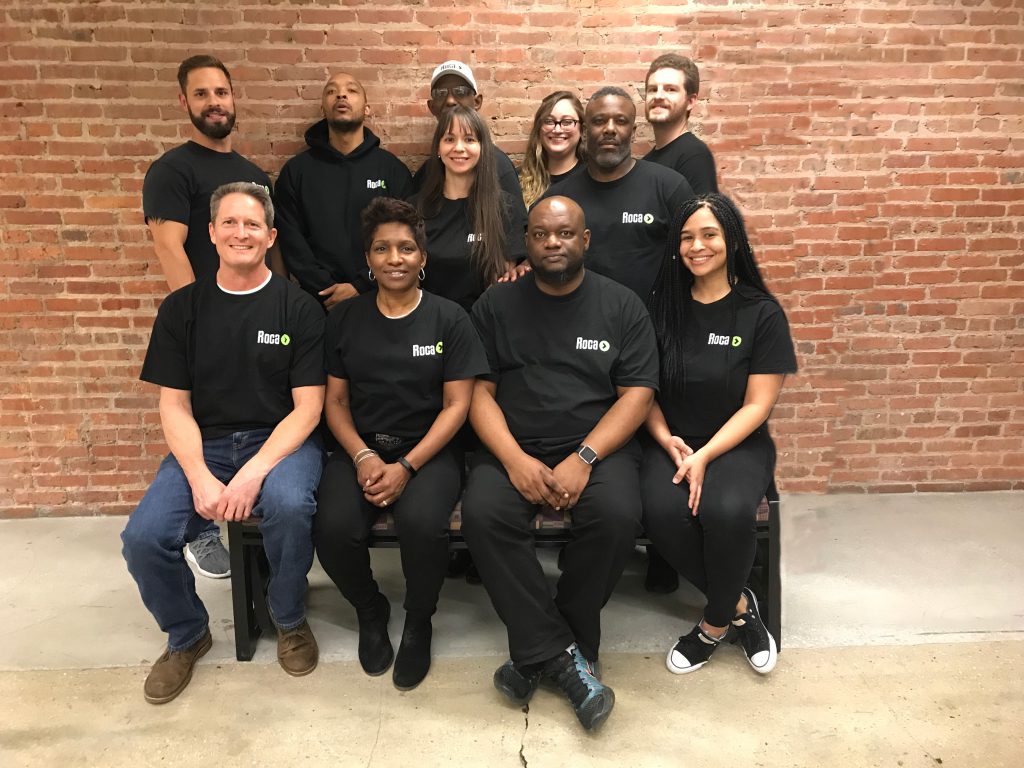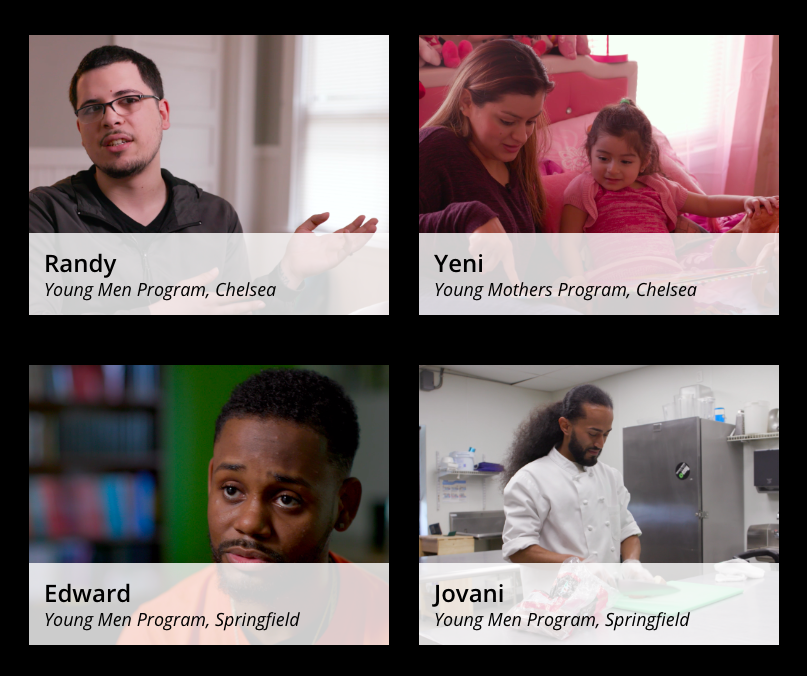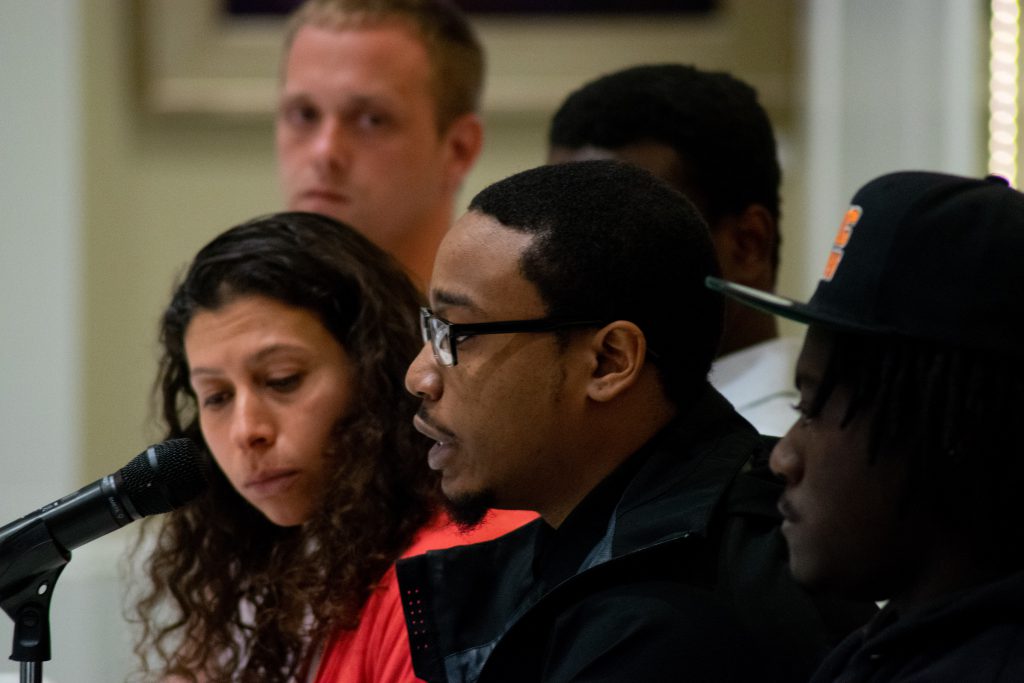Issue 10 | Spring 2019
Dear Roca friends,
Hello! We hope you are excited as we are to see spring arriving—it’s great to watch our young moms in Chelsea and Springfield getting a chance to finally play with their kids outside!
Things have been moving fast here at Roca in the past few months. In this issue of Roca Ink., we’re sharing with you the progress of Roca Baltimore in its first nine months, an update on Massachusetts’ efforts to find the best approaches to deal with young adults in the justice system, and some new stories from our young people.
We also want to share with you what we’re learning about the tragic and deadly mix of social media, trauma, and violence. We keep hearing from our young people, staff and community partners about the key role of social media in driving and facilitating violence, and for the past few years we’ve been trying to explore new ways to address this concerning issue. Last January, we brought together some of the brightest practitioners and researchers on this topic, and we are committed to working together to find new ways to adapt the work with young people to this new reality. Stay tuned for more on this topic.
Roca’s Annual Breakfast is in just three weeks! We look forward to seeing you there!
Happy spring,
Molly Baldwin
Founder & CEO, Roca

ROCA’S 2019 ANNUAL BREAKFAST
On Friday, May 10, Roca will be hosting friends, supporters, community partners, staff and young people for the 2019 Annual Breakfast. It will be a morning of inspiration and courage, a reflection on the progress of the past year, and look ahead to our vision for future work.
Governor Charlie Baker and Boston Police Commissioner William Gross will highlight critical issues facing high risk youth alongside young people from Lynn and Chelsea, who will receive the Vichey Phoung Peace Award that recognizes their inspirational progress.
Suffolk County Sheriff Steven Tompkins will return as emcee along with Roca Founder, Molly Baldwin. Roca will feature speaker Michael Jacobson, Director of the CUNY Institute for State and Local Governance and former President of the Vera Institute of Justice.
The event will be held at the InterContinental Hotel in Boston. Be sure to get your tickets today for this special morning! For more information, check here.

PROGRESS REPORT: NEW UPDATES ON ROCA BALTIMORE
It’s been nine months since Roca youth workers first took to the streets of Baltimore to bring our relentlessness to that city’s ongoing challenges. Since then, Roca Baltimore has enrolled over 70 young men, and we’re currently assessing over 40 more, just on track to meet our goal of serving 100 Baltimore young men in our first year on the ground.
It is a race against the clock to get to these young men. Tragically, some of them are shot or incarcerated before we can even get to them, and so many experience violence and trauma on a daily basis. We have to be persistent and focused: find those young men caught in the cycle of violence, knock on their doors relentlessly until they respond, build relationships, and bring them to Roca. We have no time to waste.
We have found a courageous group of staff members, community partners, city leaders and law enforcement partners who are as committed as one can be to stop violence in the city. It is our privilege to know them and work with them, and we are just humbled by what we learn every day.
Our building on 880 Park Avenue already feels like home. We invite you to stop by, ask questions, help us flex our thinking on hard topics, and work with us to build this path of hope for Baltimore and beyond.
Change is hard and it doesn’t happen overnight, but it is possible.

ROCA VOICES PAGE: NEW YOUNG PEOPLE FEATURED
Randy, Edward, Jovani, Yeni, and so many more—we consider it a privilege to be in their lives. They are our best teachers. We see young people every day who are faced with debilitating life challenges—violence, racism, poverty, lack of opportunity—and yet, still manage to move forward.
It’s why we are relentless in our work to reach out to them, to show them there is a way to build the life they want. It isn’t an easy path and change doesn’t happen overnight, but we’ve learned that when you stick with it, lasting change is possible.
On our recently updated Voices page, you can hear from our young people directly as they tell their own stories in featured video vignettes.
We’re inspired by our young people and we couldn’t be more proud of their hard work.

MASSACHUSETTS EMERGING ADULT TASK FORCE
Massachusetts is actively considering to raise the age of the juvenile court to 21, and is already exploring different ways to address young adult justice issues. Now, with a state team dedicated to this topic, we expect much more to come.
The criminal justice act of last year established a new task force to study raise the age and other police options for justice-involved emerging adults. State Senator Cynthia Stone Creem and State Representative Paul Tucker have been leading this effort, with deep commitment to young people and public safety. With policy ideas such as young adult courts and young adult units in correctional facilities, there’s plenty to consider.
With the Massachusetts Juvenile Justice Pay for Success Project, the Commonwealth is already a national leader on piloting new approaches for young adult issues: nearly 1,000 high-risk young people have been enrolled in the project in the past five years, and they are all served by Roca. The new task force is a great opportunity to build on the lessons learned and continue working for young people across the Commonwealth.

TACKLING THE CHALLENGE HEAD ON: SOCIAL MEDIA AND VIOLENCE
After several years of hearing from all our partners and staff about the deadly mix of social media, trauma, and violence, we decided to take a hard look on this critical issue. We believe there isn’t nearly as much attention to the impact of this mix on our young people and communities, and we’re determined to find a different way.
We live in the age of constant connection to social networks like Facebook, Snapchat, and Instagram. Commentary, pictures, and videos are disseminated and seen at lightning-fast speed and ever-widening reach. This online layer of interaction changes the way we engage with each other. And this is especially true for young people who are caught in a cycle of violence and trauma.
For these young people, social media plays a key role in every aspect of their lives – including violence. It is a reality that never stops, that follows them everywhere they go. They are in a group setting of hundreds of their peers at any given moment, for better and for worse.
The insults and threats that are made online are seen by all and can often trigger a real-world, violent response. It can be a lonely, isolating and depressing experience that harms young people and our communities.
Social media is here to stay, and as overwhelming as this issue may be, we need to find ways to restructure our work in a way that elevates the good and deals with the bad. We cannot shy away from the reality of our young people. Lives depend on it.
Together with our partners, we have started to build smarter ways of youth work, thoughtful and careful ways of law enforcement engagement in this space, and a safer path for young people. We will keep sharing with you what we learn, and we look forward to discussing this important issue with you.


